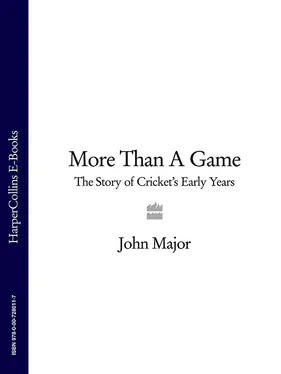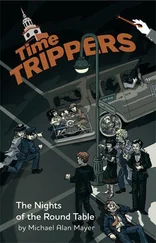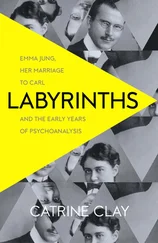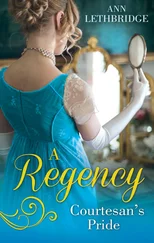One does not have to be talented to be besotted by cricket, as a thousand village games prove each summer. I first saw this at school. One boy, whose anonymity I shall protect, practised in the nets for hours – and often, I suspected, in front of a mirror – for every batting movement ended in a pose of classical perfection. No cricket whites were ever more neatly pressed, or pads or boots whiter, or bat more beautifully oiled, and when, head high, he strode out to the wicket, he oozed class and confidence. Alas, the image was false: he put so much into the elegance of every stroke that he overlooked the need to hit the ball, and all too soon would turn in surprise to look at his shattered stumps. He left the crease swiftly yet gracefully, nodding in congratulation to the bowler, head still high, bat tucked under arm, pulling off his batting gloves as if, for all the world, he was returning to the pavilion in triumph.
He was never downhearted. As he took his pads off, he would tell us all that he had been beaten ‘in the flight’ or ‘off the pitch’; and, theorists all, no one suggested he had, again, just missed a straight one. He knew the theory of cricket. He knew the statistics. He knew the spirit in which the game should be played, and he revelled in it. Runs or not, it was joy enough for him to be on a cricket pitch. I don’t know if he ever read A.A. Milne, but his poem had him exactly right:
But what care I? It’s the game that calls me –
Simply to be on the field of play;
How can it matter what fate befalls me,
With ten good fellows and on egood day!
I was so lucky that cricket was played at my grammar school; it was, with rugby, the only activity that made the experience bearable. During one game the pitch was positioned within striking distance of some enticing windows, and the temptation to put the ball through one of them was irresistible. The prize was to be a pint of illicit beer – I was only fourteen at the time, and such devilment appealed. A cross-batted heave missed the main target but did crash through an adjacent church window. The tinkle of glass brought a great cheer. It was enough: a triumph was celebrated.
Not long afterwards a heavier drink, scrumpy, caused more trouble. I drank a little too much, and as I travelled home it began to extort its revenge. I arrived safely, but when my father opened the door I was on my knees barking at him. I thought it was funny. He did not. Only my mother’s intervention saved me from being banned from cricket.
I was no cricketing prodigy, but nor was I a complete mug. I had my days, and they remain precious memories: 50 runs in a house match, with the winning hit a straight four that whistled past the bowler’s nose; 33 runs scored in three overs to win a game on a day when every hit seemed to find the boundary; 7 wickets for 9 runs, including a hat-trick, in a Colts game, when four of the runs scored off me were an edge that, half a century on, I still know that an even half-alert fielder should have caught in the slips. A meagre return for my love of the game, you might think, but only if you don’t know cricket. Runs, wickets and catches are all very well, but they don’t capture the fun of it all, the camaraderie, the hopes, the mini- triumphs and disasters, the wins, defeats and close finishes, the sunny days and the wet ones, all memories every cricketer locks away for the dark months when the summer game is in hibernation.
When my father finally lost his eyesight and all his money in the early 1950s, our family were uprooted from our modest bungalow in Surrey to two rooms of a multi-occupied Victorian relic in Brixton. The accommodation lacked finesse, but it was within walking distance of the Kennington Oval at a time when Surrey had the greatest county team of them all. I camped out at The Oval during the summer holidays as a devoted spectator. It cannot have been so, but memory insists that the sun always shone and Surrey always won. And what a feast they offered. Peter May’s bat rang like a pistol shot, and the suffering ball bounced back from the pavilion pickets before a fielder had even moved. May’s batting once got me into a frightful scrape.
I had borrowed my father’s precious gold stopwatch to time how long it took a May off-drive to reach the boundary, and in pressing the stop button it slipped from my fingers and smashed open on the terracing. The innards sprang out. The watch looked terminally sick. So did I as I confessed all to my father. ‘Tell me,’ he said, gingerly holding the watch by a broken spring, ‘about Peter May.’
May was one of many great players in that Surrey team. Tony Lock, menace shining from his bald pate, bowled the unplayable ball and caught the impossible catch. Jim Laker ambled gently to the wicket, but his off-breaks spun and spat at the batsman. The thin man, Peter Loader, was fast as a whippet; and Alec Bedser, the great medium-pacer, stately as a galleon, tormented batsmen with nagging accuracy and a leg cutter no other bowler has ever matched. Decades later he told me he discovered the leg cutter by accident, and had taken two years to perfect it. ‘It’s a leg spinner, really,’ he confided, ‘but you need these to bowl it properly.’ Thereupon he held up the enormous Bedser hands and chuckled. These were golden days of sun and shadows, Tizer and sandwiches, and I shall never forget them.
The 1950s were also a time of massive immigration to England from the West Indies, and many of the new Britons settled in Brixton. The house we lived in was for a time multi-occupied and multi-racial, and it provided a good primer on poverty for a future Conservative Prime Minister. I knew the immigrants as neighbours. I lived with them. I played with their children. I shopped with them in Brixton market. I saw them for what they were: men and women seeking opportunity and a new life in a land immeasurably more wealthy than the ones they had left behind.
Others, more fearful, more suspicious, saw them in a harsher light. They feared for their jobs and their livelihoods. They were frightened of possible turmoil in their neighbourhoods. Bigots and foolish men inflamed these fears. Pessimists predicted trouble. Brixton became a powderkeg of racial discontent. People waited for it to blow. Waited for the riots, the lawlessness. They waited in vain. The new Britons settled in. The dire predictions of conflict proved to be wrong.
In my youthful innocence, I wasn’t surprised. Instead of inciting fear, the bigots and pessimists should have gone to The Oval, where, when the West Indies played, it was carnival time: the atmosphere was noisy and full of fun as the crowd enjoyed glorious days of cricket. For those in the packed ground the painful reality of life in Brixton was put aside, even though at close of play it was still there. Prejudice and hardship were daily companions to the new Brixtonians. Dr Johnson, who knew London two hundred years earlier, had it right: ‘This mournful truth is everywhere confessed/Slow rises worth, by poverty depressed’.
Slow rises worth – but it did rise. And the West Indians’ cricket, the way they played and the way the team conducted themselves in victory, did much to help. A few years earlier they had taken on England at her own game, in her own country, at the very headquarters of cricket. And they beat her on merit. Perhaps no win in cricket ever had such social significance as Ramadhin and Valentine’s destruction of England at Lord’s in June 1950. A big hundred by Clyde Walcott set it up; it was then won by the charm and guile of the cricketing sophisticate’s delight: the art of great spin bowling. It was intelligent cricket – the West Indies out-thought England as well as outplayed them. As a result, all West Indians walked a little taller in their tough lives because their national cricket team had lifted their morale. No wonder the calypso rang out in celebration: ‘Cricket, lovely cricket’, indeed!
Читать дальше












